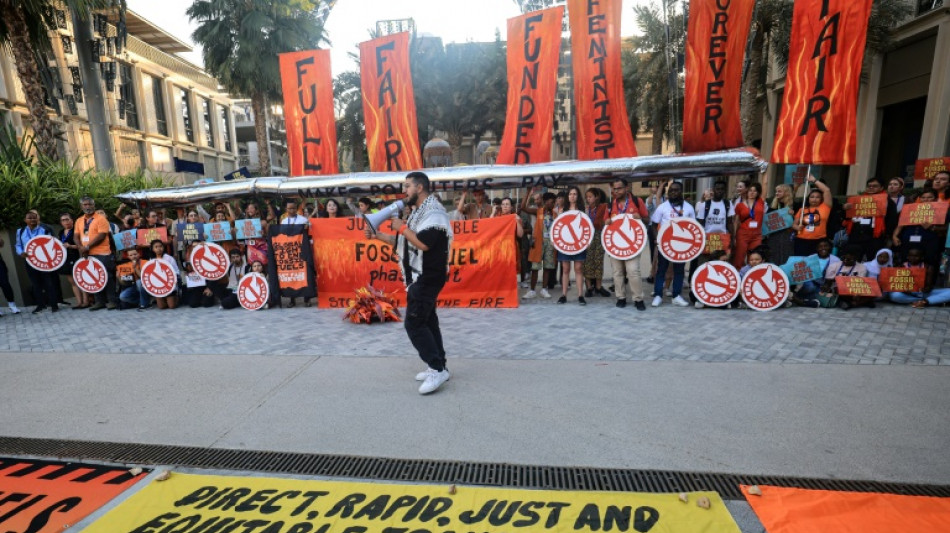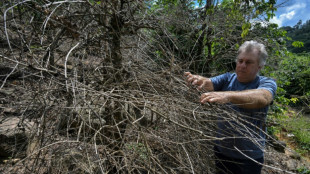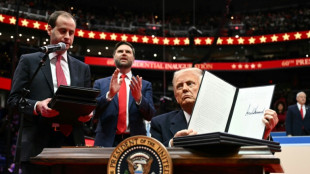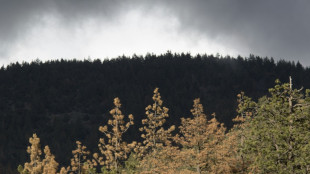

UAE to try again for climate deal after fury on fossil fuels
The United Arab Emirates promised Tuesday to try again to strike a deal as the Dubai climate summit passed their deadline, with at-risk nations and Western powers rejecting a proposal that stopped short of phasing out fossil fuels.
The 13-day COP28 summit in the glitzy metropolis built on petrodollars has debated a historic first-ever global exit from oil, gas and coal, the main culprits in a planetary crisis of warming.
But a draft put forward on Monday by COP28 president Sultan Al Jaber, himself head of the UAE oil company, fell well short, instead presenting reductions in fossil fuels as one of several options.
Negotiators described a mood of anger and tension in talks that again ran through the night, with activists confronting delegates and island leaders saying their very existence was at risk.
The Emirati hosts put a brave face on the outrage, saying they were working on a new draft and noting that UN rules require consensus from the nearly 200 countries at COP28.
"We need to work on how we put their views into the text in a way that everybody can be happy with," said Majid Al Suwaidi, COP28 director general.
The text, he said, offered "honest, practical, pragmatic conversations about where people's red lines really were".
Saudi Arabia, the world's largest oil exporter, has led opposition to what it sees as a threat to its financial lifeblood.
Seeking to force decisions, the Emiratis had urged a deal before the summit's official close Tuesday morning, but Suwaidi said after the deadline that the priority was not to "get the most ambitious outcome possible".
- New push on fossil fuels -
EU climate chief Wopke Hoekstra, who huddled with at-risk nations and UN Secretary-General Antonio Guterres, said he believed a "supermajority" supported strong language on fossil fuels.
German negotiator Jennifer Morgan said talks were seeking "a text the world can coalesce around" that would clearly signal a shift "away from the fossil fuel era".
Zambia, speaking on behalf of the African bloc, supported a phase-down but said the continent's oil producers must receive financial support.
Scientists say the planet has already warmed by 1.2 degrees Celsius (2.2 Fahrenheit) from pre-industrial times and that 2023 -- marked by lethal disasters including wildfires across the world -- has likely been the warmest in 100,000 years.
The 2015 Paris summit endorsed an ambition of checking warming at 1.5 Celsius -- a goal endorsed in the latest draft, but which critics say is virtually impossible without serious efforts to curb oil, gas and coal.
The most emotionally charged appeals have come from low-lying islands, which fear being submerged as polar ice melts and whose teams flew to Dubai at great expense to their national budgets.
John Silk, the negotiator from the Marshall Islands, which lies on average 2.1 metres (seven feet) above sea level, said Monday that his country "did not come here to sign our death warrant".
- 'War for survival' -
Veteran US negotiator John Kerry has also urged stronger language on phasing out fossil fuels, even though the United States is the world's top oil producer and the rival Republican Party is deeply opposed to action on climate.
"This is a war for survival," Kerry, who helped negotiate the Paris accord, told a closed-door session in the early hours Tuesday.
Former US vice president Al Gore, who won the Nobel Peace Prize for his climate advocacy, said that Monday's "obsequious" draft looked as if it had been written by the OPEC oil cartel and warned that without changes the summit would be "the most embarrassing and dismal failure in 28 years of international climate negotiations".
The 21-page text does not go so far as to demand action on fossil fuels, only presenting measures that nations "could" take.
"This is not a menu in a restaurant. We have to do all of these things," Canada's Steven Guilbeault, part of a group of ministers tasked by Jaber to shepherd negotiations, told AFP.
"Parties are working around the clock," she said. "Negotiators are scurrying around rooms and on phone calls to try to find the places where they can agree."
P.MacNair--NG



